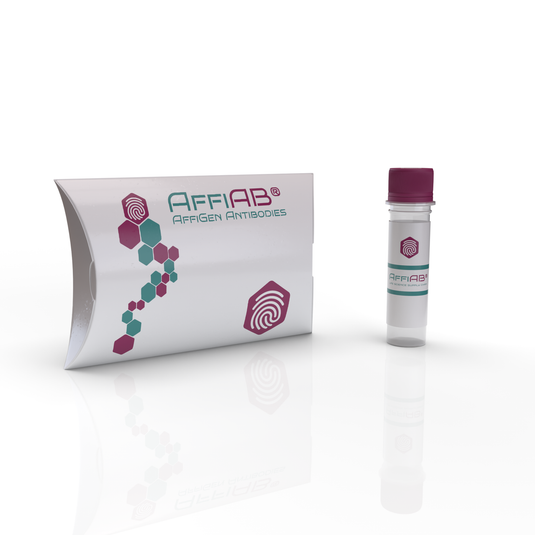AffiAB® Goat Anti-GAPDH Polyclonal IgG Antibody
The AffiAB® Goat Anti-GAPDH Polyclonal IgG Antibody is an immunogenically active antibody, derived from goats, that recognizes glyceraldehyde-3-phosphate dehydrogenase (GAPDH). This antibody is ideal for protein detection and western blotting applications.
Host: Goat
Species: Human
Description: AffiAB® Goat Anti-GAPDH Polyclonal IgG Antibody is a type of antibody that specifically recognizes and binds to the glyceraldehyde-3-phosphate dehydrogenase (GAPDH) protein. GAPDH is a ubiquitous enzyme involved in glycolysis and plays a critical role in cellular metabolism. It is commonly used as a loading control for Western blotting and other protein detection assays. This antibody is produced by immunizing goats with a recombinant GAPDH protein or a peptide derived from the protein, and it can be used in various applications including ELISA, Western blotting, immunoprecipitation, and immunofluorescence microscopy.
Gene Identifier/Accession Number: ENSG00000111640
Form: N/A
Concentration: 2 mg/mL
Type: Primary
Clonality: Polyclonal
Isotype: IgG
Conjugation: Unconjugated
Application: Western Blot, Immunofluorescence, Immunohistochemistry PARAFFIN PROTOCOL , Immunohistochemistry FROZEN
Storage: For continuous use, store at 2-8 °C for one-two days. For extended storage, store in -20 °C freezer. Working dilution samples should be discarded if not used within 12 hours.
Special instructions: The antibody solution should be gently mixed before use.
Goat Anti-GAPDH Polyclonal IgG Antibody
In the realm of molecular biology and cellular research, scientists often rely on powerful tools to investigate and analyze protein expression and regulation. One such invaluable tool is the Goat Anti-Glyceraldehyde 3-Phosphate Dehydrogenase (GAPDH) Polyclonal IgG Antibody. This versatile antibody has revolutionized the way researchers study cellular metabolism, gene expression, and a multitude of biological processes.
The Significance of GAPDH
Glyceraldehyde 3-Phosphate Dehydrogenase (GAPDH) is a ubiquitous enzyme involved in glycolysis, a fundamental metabolic pathway in all living organisms. Beyond its role in energy production, GAPDH is a multifaceted protein that participates in diverse cellular functions, including regulation of gene expression, membrane trafficking, and apoptosis. Its versatility makes GAPDH a pivotal player in both normal and pathological cellular processes.
Goat Anti-GAPDH Polyclonal IgG Antibody: An Overview
The Goat Anti-GAPDH Polyclonal IgG Antibody is a highly specific and reliable research reagent. It is generated by immunizing goats with purified GAPDH protein, resulting in the production of a polyclonal mixture of immunoglobulins G (IgG) capable of recognizing multiple epitopes on the target protein. This polyclonal antibody has found extensive use in a variety of experimental applications due to its robust performance.
Applications of Goat Anti-GAPDH Polyclonal IgG Antibody
Western Blotting:
One of the most common applications of this antibody is in Western blotting. It enables researchers to assess the expression and relative abundance of GAPDH in cell lysates and tissue extracts. Moreover, it serves as a valuable loading control to normalize protein quantification, ensuring accurate comparisons between samples.
Immunoprecipitation (IP):
Researchers employ this antibody in IP assays to isolate and study protein complexes containing GAPDH. This technique aids in unraveling the intricate protein-protein interactions critical for various cellular processes.
Immunocytochemistry (ICC) and Immunohistochemistry (IHC):
The Goat Anti-GAPDH Polyclonal IgG Antibody is also utilized in ICC and IHC experiments to visualize the subcellular localization of GAPDH within cells and tissues. This information can offer insights into its dynamic distribution in different cellular contexts.
Enzyme-Linked Immunosorbent Assay (ELISA):
ELISA assays utilize this antibody to quantify GAPDH levels in biological samples, facilitating the assessment of protein expression changes under different experimental conditions.
RNA Binding Studies:
GAPDH has been implicated in RNA metabolism and regulation. Researchers can use this antibody in RNA immunoprecipitation (RIP) assays to investigate GAPDH's role in RNA binding and regulation.
Conclusion
The Goat Anti-GAPDH Polyclonal IgG Antibody has become an indispensable tool in biological research. Its versatility and specificity make it ideal for a wide range of applications, from protein expression analysis to elucidating the multifaceted roles of GAPDH in cellular processes. As scientists continue to explore the complexities of cellular biology, this antibody remains a steadfast ally in their pursuit of knowledge and discovery.

